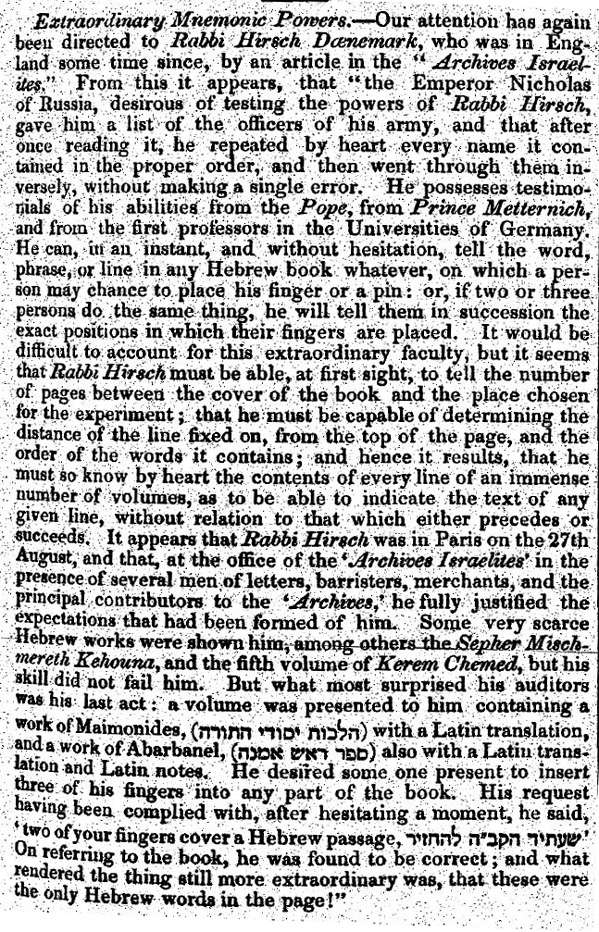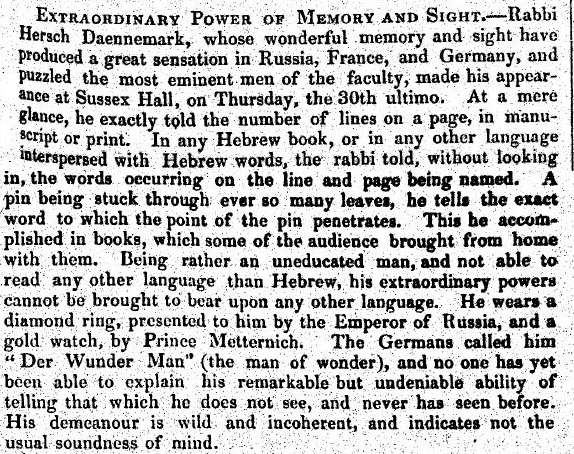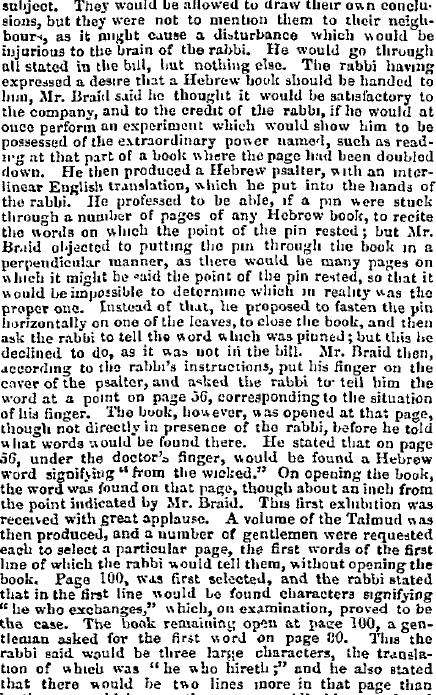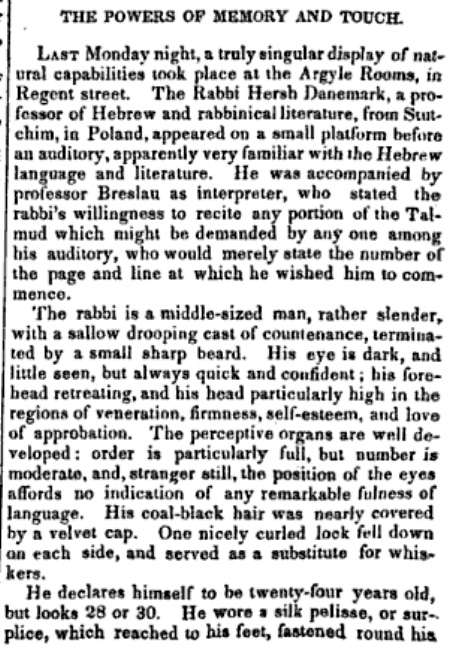This was the clipping:

I came across another clipping in the same periodical and realized that this Hirsch Daenmark was still at if a few years later (August 7, 1846):

so I decided to dig a little deeper. A much fuller account was printed September 9, 1846 in the Manchester Guardian. As you can see, the exhibition seems to have been billed as a supernatural demonstrator. The reporter found that it did seem to exhibit his extraordinary memory, but no supernatural powers:



The January 7, 1875 issue of The Academy referred back to Rabbi Hirsch Denmark in an review of a book about memory:


This article notes that Prosper Lucas wrote about Hirsch Denmark, and indeed he did. Several pages of his 1847 book Traité philosophique et physiologique de l'hérédité naturelle are about Hirsch Denmark (413-419):

To summarize Lucas's account as best as Google Translator was able to provide: Hirsch Denmark is a great example [of Lucas's thesis about heredity), because of the public nature of his cases, and the empirical reality of his phenomenon. He arrived in Metz in August of 1842 bearing letters from the Pope, Prince Metternich and famous professors in Germany. He is a Polish Jew, average looking, and aged 34, and he appears very nervous. He said that he first became aware of his strange power at age 12. He considers it a gift from God, sort of a combination of the natural and the supernatural. On the one hand, he acknowledged having a phenomenal memory. On the other, he claimed to be able to do it with works which were unfamiliar to him. He refers to himself as "Der Wundermann."
He gave three demonstrations in Metz. The first one was on August 2, and was attended by the Chief Rabbi and some Hebrew scholars, the second at the Seminary where the teachers all knew German and Hebrew, and the third in a private home, attended by several notables. Next follows a description of the Talmud, and notes that it consists of 36 volumes (bibliophiles are welcome to recognize the particular edition). The following were how the demonstrations were conducted:
1. He has people look at the book and affirm that there was nothing suspicious about the book that could indicate that there was a trick.
2. Hirsch asked someone to to place a finger or pin inside a closed book, which is then turned on its side. He then said which word the finger was covering, or if it was covering white space.
3. He asked several people give a page number and designate a few lines from the top or bottom of the page, either text and commentary. In one case he was asked to read a certain line on page 38, and it wasn't what he had said. Then he told them that there was a misprint in the page number, and it should be on the following page, and indeed it was.
4. He'd have someone put his ear on a page, and he could tell which words were covered by the ear. Then he could do the same with several pages closed together.
5. More of the same.
6. "
7. They opened a book at random, and stuck a pin in. He was asked to tell which words were at that place in pp 58-71 of the volume. He would also indicate where it crossed no word. Sometimes he would recite the word, and then also add what the commentaries on the page said about the word.
When he quoted a verse (ie, if the place landed on a biblical verse) he'd repeat the entire verse.
8. A Hebrew translation of the New Testament was brought to him. After reading it he was able to perform the finger experiment as well.
9. Gerson Levy (1784-1864) produced a Hebrew manuscript written in the Hebrew cursive used by Polish Jew, but it also contained square Hebrew used in printing. If someone's finger was on the cursive, he indicated that they should put it elsewhere, where the other kind of script was and he was able to perform. He also was able to do it on other books provided by Levy that he was unfamiliar with.
One thing to note is that before performing, he would always touch the volume and some of its pages. Asked if it would suffice if he could touch a person in contact with the book, he said that he didn't know, never having tried it.
When a book was placed on top of the Bible, he hesitated for some time, and then began to read the designated line. He was then asked to do it without touching the Bible, but refused. Finally he agreed to do it touching the hand of someone touching the Bible with his handkerchief.
At this point the author footnotes that in his opinion his insistance on touching the Bible was because of his belief in the supernatural aspect to his ability. He was able to do this, although sometimes he made small errors, such as coming to the line above or below the one he meant,
Lucas says he will omit the accounts of how he triumphed before the Pope in Rome, although he does mention that Hirsch was given a Hebrew manuscript in gold letters from the Vatican library, and succeeded.
Any noise in the room caused Hirsch Denmark to act like he was in pain. He insisited on only performing indoors, and required total silence.
Lucas concludes the account by noting that Denmark told him that he has a ten year old son in St. Petersburg with similar, or even more remarkable abilities, and this was demonstrated before the Czar of Russia.
At least, that is a sense of what it was about.
I looked a little deeper and saw that there was an account of him as early as 1839. The following was printed in The Family Magazine (published in Cincinnati, but this does not mean that Denmark had visited America. The demonstration was at a popular venue in London):




This is all that I've been able to learn thus far. I will add a new post if I learn more.
Finally, below is a famous article "Mnemonic Feat of the Shass Pollak" by George Stratton in the third issue of the 1917 Psychological Review (24):





Who is Farihi?
ReplyDeletehttp://www.jewishencyclopedia.com/view.jsp?artid=43&letter=F
ReplyDelete'Sihas' Pole?
ReplyDeleteShas. It's a typo, possibly occasioned by an inability of someone, ie, the writer himself, and editor, or the typesetter to read the notes or manuscript of this article. As can be seen from the last article from that Psych journal, this sort of guy was known as a "Shas Polak," that is a "Polish guy who knows Shas by heart and can do these tricks."
ReplyDeleteIncidentally, Rabbi Hirschsprung allegedly was able to do something like it. If that's true, I suppose he's a rare (or even singular) example of a Shas Polak who wasn't otherwise a basket case or am haaretz. More seriously, sounds like these guys may have had some sort of savant syndrome.
R David Weiss Halivni is another example of someone who could do that (he no longer can, at least thats what he tells people) w/o being a basket case.
ReplyDeleteBut I wonder if the more proper term to use is not "idiot savant"? ie it is a type of autism
I did suggest savant syndrome.
ReplyDeleteAs you can see, the exhibition seems to have been billed as a supernatural demonstrator. The reporter found that it did seem to exhibit his extraordinary memory, but no supernatural powers
ReplyDeleteShades of Arthur Lintgen.
If you are interested in this general phenomenon (i.e., truly eidetic memories), see Mind of a Mnemonist, by A. Luria. The subject there was also a eastern european jew.
ReplyDeleteFascinating article!
ReplyDeleteThe Vilna Gaon, of course, was also famous for his memory. But did you know that he actually made it into Ripley's Believe It Or Not for that?
-- Phil
Phil, I did not. Do you have a date or a source? I would *love* to track down that Ripley's Believe it Or Not.
ReplyDelete(Brings me back to my childhood!)
S.,
ReplyDeleteFrom the 6th hit on Google for "Ripley Vilna": "The Gaon of Vilna and His Cousinhood by Dr. Neil Rosenstein. {Elizabeth, New Jersey: The Computer Center for Jewish Genealogy, 1997, 430+ pages, ISBN: 0-9610578-5-8} This book covers the family ancestry of Rabbi Elijah of Vilna, who was Lithuania's greatest Talmudic scholar a...His brilliance extended to mathematics, geometry, astronomy and other sciences. His fame as a "Mental Marvel" even gained him entry into the pages of Ripley's Believe It Or Not! in 1929. "
Thanks MDJ!
ReplyDeleteBelieve it or not, I was going to say that my "source" was my visit, about ten years ago, to one of the lopsided Ripley museums, where the info was posted next to a display of a boy who accidentally flew several miles via helium balloons.
-- Phil
I remember, a long time ago, watching the TV show, "That's Incredible" where a man was demonstrating his amazing memory, having memorized the entire book It by Stephen King. I was truly impressed. Later on in life, when I started learning Torah, I heard about some people who memorized the entire Talmud (Rav Hirshsprung from Montreal was one who did the 'pin test.' Any other recent rabbis?) Now that really impressed me. Not just because the Talmud is so much longer than It, but because it is so much more meaningful. -- Phil
ReplyDeleteThanks Phil, and MDJ.
ReplyDeleteA guy was considered impressive because he memorized It? Wow. I guess they hadn't heard of Kim Peek.
There was a bachur in Brisk who could do it, but he never let anyone talk about it, as he didn't want to become famous as a baki.
ReplyDeletewow! very good blog posting skills. i wish i was you..
ReplyDeletei am a freelance writer..
see my works here ------> Cheap Suits
This is a clip I have found on an Italian daily newspaper published in Turin (25-09-1847):
ReplyDeletehttp://marianotomatis.tumblr.com/post/90493065776/gazzetta-piemontese-saturday-25-september-1847
Gazzetta Piemontese, Saturday 25 September 1847
Next Monday [27 September 1847] at 7 PM in a room in the Gran Corso Cafè, Vittorio Emanuele Square, the Rabbi Hersch Dannemark, portentous man, well known in Europe, will be honoured to offer evidences about his inexplicable talent.
Those who will be present should be there at the exact time, keeping quiet and silent during the tests, because the smallest noise could disturb Dannemark’s cerebral organ, and his performance would be affected by it.
Attenders are invited to bring with them any book in any language, provided that there are some jewish words somewhere.
The ticket will cost 5 Italian Lire.